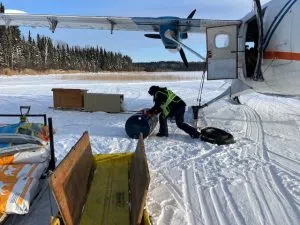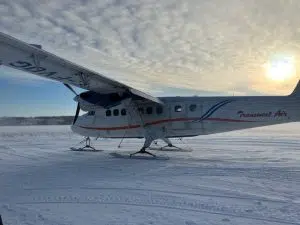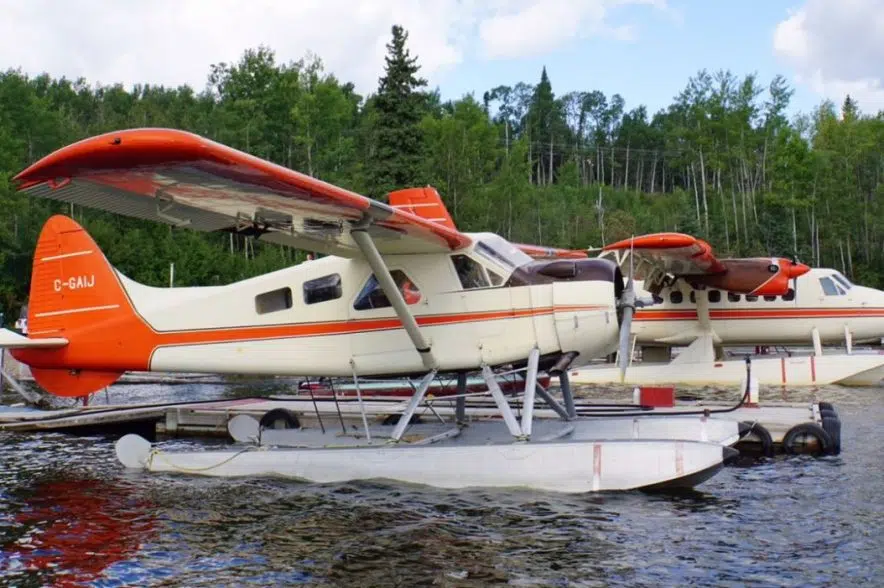Outfitters in Saskatchewan say a shortage of pilots has business owners worried about how they’ll get supplies and customers to their lodges this season.
New Canadian aviation regulations, which came into force in December, mean pilots can’t spend as much time in the air as they previously could.
Harvey Kroll is the owner and operator of Hatchet Lake Lodge and chair of the Saskatchewan Commission of Professional Outfitters. He said the new regulations are “certainly creating problems,” and are adding to concerns many Saskatchewan outfitters already had.

Freight is unloaded from a plane at Paull River Wilderness Camp in January 2023. (Submitted/Wayne Galloway)
“If you’re flying a floatplane that used to use one pilot, now you’re probably going to need two,” Kroll explained.
He said flying times were basically cut in half by the new requirements.
“It was tough to find pilots anyway,” Kroll said, calling it a major problem for the industry.
“There just aren’t enough pilots,” he said.
The shortage has been especially acute since the pandemic, Kroll noted, when many pilots retired or could not complete training requirements.
Candy Goodwin, owner and operator of Reel North Outfitters on McTavish Lake, said she isn’t sure what the upcoming season will look like for her business.
The frustrations surrounding the new air regulations factored into the closure of Osprey Wings in 2022. That company was one of the biggest family-run charter plane operations servicing northern Saskatchewan, she said.
Kroll said it seems the problem has now reached a “critical point.”
Saskatchewan has only a few floatplane operations, and Kroll said he and many other outfitters in the region who relied on the charter-flight service are keeping their fingers crossed, hoping someone else will step in to fill the gap in service that’s been left by Osprey Wings’ closure.
“We’re all sitting at the edge of our chairs waiting for someone to come in and take over that operation,” Kroll said.

A plane carrying freight to Paull River Wilderness Camp in northern Saskatchewan in January 2023. (Submitted/Wayne Galloway)
Goodwin said she’s also hoping someone will take over the service Osprey Wings was providing. Her outfitting business, she noted, relied on that company for 22 years.
Osprey’s flights would run from 5:30 a.m. through 7 p.m. during the summer, Goodwin said, meaning her supplies and passengers would arrive first thing in the morning during the outfitting season.
“Now that they’ve shut down, we are really quite stuck,” Goodwin said. “That’s how we get really everything.”
The problem is only becoming more pressing, Kroll said, as many outfitters are already booked or booking for the upcoming season. Come May, he said there’s a very real possibility that outfitters may not have the means to transport supplies and customers to their operations.
Small planes also transport firefighting crews to the northern part of the province when they are needed, Goodwin said, and deliver supplies to trappers and cabin owners living up north throughout the year.
“There’s still people who live up there, summer and winter, and the only way they get their supplies is by plane,” Goodwin explained.
Ultimately, she added, the shortage of pilots and available operations could mean some outfitters will have to close their doors if a solution isn’t found by May.
Some outfitters are already feeling more pressure than others. Many are living at their wilderness camps through the winter and struggling to co-ordinate freight drops.
“We’re all very hopeful, (but) it’s something that’s totally out of our hands,” Kroll shared.
He said some of the larger operations that serve both Manitoba and Saskatchewan could possibly help fill the gap, but no decisions have been made so far. While businesses open and close over the years, Kroll said it’s typical for someone else to step in. The current shortage, he said, seems unprecedented.
“We’ve never dealt with anything like this before,” Kroll said.
Thankfully for Goodwin, she’s been able to procure services with Rise Air out of La Ronge for the upcoming season. That operation only has two floatplanes, she noted, and is much more costly — double the price of Osprey Wings for the use of one of their planes, and about $1,000 more per flight for their other.
Goodwin noted that the change also means she hasn’t been able to keep her normal schedule. Rise Air’s flights are all scheduled for 1 p.m. arrivals, she said, and given the significant demand for service and the limited operations available, she doesn’t know how strictly the company will be able to keep to that schedule.
“With all the outfitters that’ll be looking for flights, that’s going to be really tough,” Goodwin said.
Despite the uncertainty many outfitters are facing, Kroll said he’s trying not to dwell on the negativity.
“We’re a pretty resilient group,” Kroll said. “We’ve got to continue to move forward and plan as if things are going to happen.”
Goodwin said she’s doing the same, but isn’t as excited for the upcoming season as she usually is.
“We love what we do and we look forward to it every year. I guess it’s just a lot of unknown and uncertainty,” she said.











